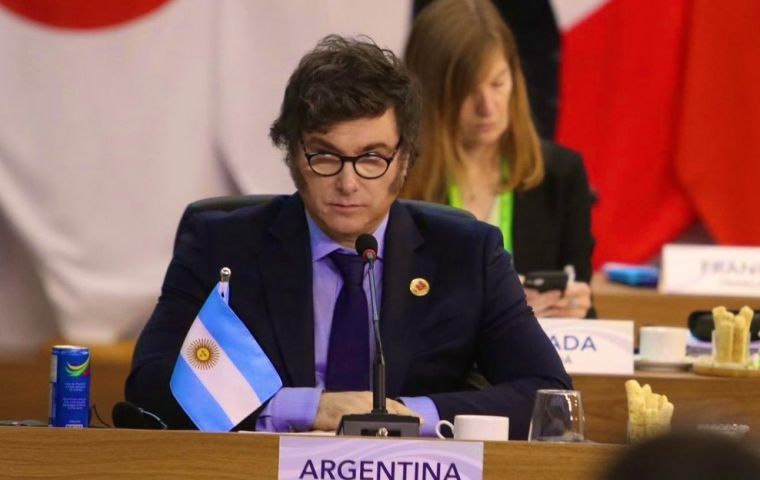MercoPress. South Atlantic News Agency
Argentina becomes newest founding member of Lula's alliance against hunger
 Milei is now expected to agree with other Brazilian initiatives within the G20 Summit
Milei is now expected to agree with other Brazilian initiatives within the G20 Summit Javier Milei's Argentina became after last-minute negotiations the 82nd country to join the Global Alliance against Hunger and Poverty, Brazil's initiative launched during the two-day G20 Summit in Rio de Janeiro. With Buenos Aires' decision, no G20 country stayed out of Brazilian President Luiz Inácio Lula da Silva's partnership which is also made up of the African Union and the European Union, in addition to 9 financial institutions, 24 international organizations, and 31 philanthropic and non-governmental entities, totaling 148 founding members.
Membership has been open since July of this year, and countries can join at any time. In addition to the G20 members, nations such as Uruguay, Ukraine, Switzerland, Nigeria, Angola, Colombia, Jordan, and Lebanon, among others, have joined the initiative. The expectation is that the governance structure of the alliance will be in place by 2025.
It is also expected that Milei will agree with other Brazilian initiatives within the G20, such as the proposal for taxation of the super-rich and measures against climate change.
In the case of the Alliance Against Hunger, accession is formalized through a declaration of commitment defining general and customized measures to be adopted “with the priorities and specific conditions of each member” to achieve these Sustainable Development Goals (SDGs).
The Global Alliance hopes to reach 500 million people with cash transfer programs in low- and lower-middle-income countries by 2030, expand quality school meals to 150 million more children in countries with endemic child poverty and hunger, and raise billions in credit and donations through multilateral development banks to implement these and other programs.
The Alliance will have its governance linked to the G20, but will not be restricted to the nations that make up the group. It will be administered by a Council of Champions and the Support Mechanism. The governance system should be operational by mid-2025. Until then, Brazil will provide temporary support for essential functions.
After Monday's announcements, the 82 countries making up the alliance are: Angola, Antigua and Barbuda, Argentina, Armenia, Australia, Bangladesh, Benin, Bolivia, Brazil, Burkina Faso, Burundi, Cambodia, Canada, Chad, Chile, China, Colombia, Cyprus, Denmark, Dominican Republic, Egypt, Equatorial Guinea, East Timor, Ethiopia, Finland, France, Germany, Guatemala, Guinea, Guinea-Bissau, Haiti, Honduras, India, Indonesia, Ireland, Italy, Japan, Jordan, Kenya, Lebanon, Liberia, Malta, Malaysia, Mauritania, Mexico, Mozambique, Myanmar, The Netherlands, Nigeria, Norway, Palestine, Paraguay, Peru, Philippines, Poland, Portugal, Russia, Rwanda, Saint Vincent and the Grenadines, São Tomé and Príncipe, Saudi Arabia, Sierra Leone, Singapore, Slovakia, Somalia, South Africa, South Korea, Spain, Sudan, Switzerland, Tajikistan, Tanzania, Togo, Tunisia, Türkiye, Ukraine, United Arab Emirates, United Kingdom, United States, Uruguay, Vietnam, and Zambia.
Joining these countries are the African Union (AU) and the European Union (EU) plus the following international organizations: African Union Development Agency - New Partnership for Africa's Development (Auda-Nepad); CGIAR; Economic Commission for Latin America and the Caribbean (ECLAC); Economic and Social Commission for Western Asia (Cesao); Community of Portuguese-Speaking Countries (CPLP); United Nations Conference on Trade and Development (UNCTAD); United Nations Children's Fund (UNICEF); International Fund for Agricultural Development (IFAD); United Nations Research Institute for Social Development (UNRISD); Inter-American Institute for Cooperation on Agriculture (IICA); League of Arab States (LAS); United Nations Educational, Scientific and Cultural Organization (UNESCO); United Nations Industrial Development Organization (UNIDO); Food and Agriculture Organization of the United Nations (FAO); Organization of American States (OAS); International Labor Organization (ILO); Organization for Economic Cooperation and Development (OECD); World Trade Organization (WTO); World Health Organization (WHO); Pan American Health Organization (PAHO); World Food Program (WFP); United Nations Development Program (UNDP); United Nations Human Settlements Program (UN-Habitat); United Nations Environment Program (UNEP).
The Global Alliance against Hunger and Poverty will also include these international financial institutions: Asian Development Bank (ADB); Asian Infrastructure Investment Bank (AIIB); Latin American and Caribbean Development Bank (CAF); European Investment Bank (EIB); Inter-American Development Bank (IDB); World Bank Group; African Development Bank Group (AfDB); New Development Bank (NDB); Global Agriculture and Food Security Program (GAFSP).
Also making up the alliance will be these philanthropic foundations and Non-Governmental Organizations (NGOs): Abdul Latif Jameel Poverty Action Lab (J-PAL); Articulação Semiárido Brasileiro (ASA); Bill & Melinda Gates Foundation; Brac; Children's Investment Fund Foundation; Child's Cultural Rights & Advocacy Trust Agency; Citizen Action; Education Cannot Wait; Food for Education; Food of Tomorrow Institute; Getúlio Vargas Foundation (FGV); GiveDirectly; Global Partnership for Education; Ibirapitanga Institute; Institute for Climate and Society (ICS), International Chamber of Commerce; Leadership Collaborative to End Ultrapoverty; Maple Leaf Early Years Foundation; Maria Cecília Souto Vidigal Foundation; Oxford Poverty and Human Development Initiative (OPHI); act Against Hunger; Rockefeller Foundation; Stockholm International Peace Research Institute (Sipri); SUN Movement; Sustainable Financing Initiative; Their World; Trickle Up; Village Enterprise; World Rural Forum; World Vision International; Zero Hunger Institute.
(Source: Agencia Brasil)




Top Comments
Disclaimer & comment rulesCommenting for this story is now closed.
If you have a Facebook account, become a fan and comment on our Facebook Page!